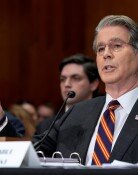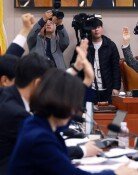[Editorial] Substantiate inter-Korean relations
[Editorial] Substantiate inter-Korean relations
Posted January. 02, 2001 19:14,
The momentum provided by the historic June-15 Inter-Korean Joint Declaration last year is expected to be continued through this year. As usual, North Korea, in a joint editorial, dated Jan.1, carried in the ruling Workers' Party organ, military and youth papers, underlined the implementation of the South-North joint communique and made it clear that it would continue to pursue economic reform and maintain the inter-Korean and international policy goals set this year. President Kim Dae-Jung also stressed once again in his New Year message that he would promote peace and cooperation between the two Koreas.
The watershed in the inter-Korean relationship this year will be to see whether North Korean Defense Commission Chairman Kim Jong-Il will visit Seoul. In view of the present circumstances, his South Korean visit is still uncertain. But if he does come to Seoul, the occasion would go a long way to solidifying the ground for inter-Korean reconciliation and cooperation and represent great progress in providing systematic devices for s reducing tensions on the Korean peninsula.
Kim Jong-Il's Seoul visit, like President Kim's visit to Pyongyang last June, should be realized on the principles of mutual respect of their interests and concessions from the far-reaching perspective for the future of the nation. Admittedly, North Korean leader's visit here would bear a great significance, but if the government is too obsessed with his coming and loses its prestige, the event would not able to attract popular support.
The same is the case with Pyongyang. If the North asks for too much and attaches many conditions in return for his visit his Seoul trip would cause uncomfortable relationship with the Seoul government.
In retrospect, during the course of the rapid development in the inter-Korean relations since the inter-Korean summit last June, Pyongyang has put forward a series of demands that were hardly acceptable to Seoul and often acted quite differently from the mutual agreements. For that matter, the government has come under fire from the people that it was being dragged around by the North Koreans. As a result, the government's North Korean policy spawned distrust from the general public.
This kind of practice must be done away this year. Once accords have been reached, they should be kept and implemented by all means. In this manner, mutual confidence can be built and further agreements made possible.
Now is the time for the two Koreas to make a prudent review of the contents of the bilateral agreements. If the North neglects the basic necessities for the development of the inter-Korean relationship and tries to gain economic gains in return for its cooperation on some casual events, healthy progress on bilateral relations will be difficult.
But most important is the Seoul government's posture regarding the implementation of the inter-Korean programs. If the government continues to be pushed around by Pyongyang, it will be hard for the government to expect public support not only for the would-be Kim Jong-Il visit to Seoul but also all other government policies toward the North. A precious lesson that was acquired from the inter-Korean process since the June-15 summit declaration is that only when the government faces the North fairly and squarely can it build popular confidence and consensus.







